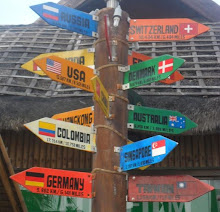New Malaria Vaccine
Wonderful news for people in the developing world still affected by malaria. Rhoel Dinglasan an entomologist and biologist at Johns Hopkins University developed a vaccine that worked in a way that keeps mosquitoes from spreading malaria if they bite someone who has been inoculated with the vaccine--thereby preventing them from spreading the disease. Dinglasan has Filipino roots too so this makes it more awesome.
From Time magazine:
Malaria was eradicated in the U.S. by 1951, so Americans can be forgiven for not giving the disease much thought. But the mosquito-borne scourge is responsible for the deaths of nearly a million children under age 5 each year — mostly in Africa — killing one child every 30 seconds. Half the world's population remains at risk — including travelers to affected countries.
Traditional vaccines work by introducing a killed or weakened version of a disease into the body, where the immune system spots it and cranks out antibodies against it. Then, if a wild strain of the pathogen comes along later — one that has the power to sicken or kill — the body is ready for it. The new approach is different. Developed by Rhoel Dinglasan, an entomologist and biologist at Johns Hopkins University Hospital, it would instead work within the mosquito gut.
Dinglasan has found an antigen, called AnAPN1, that causes humans to create antibodies that prevent transmission of malaria by mosquitoes. Get enough of these antibodies into mosquitoes, and you lock the disease up there and prevent it from infecting us. Sounds good, but how do you implement such a strategy? You can hardly vaccinate the mosquitoes themselves. Instead, you put the AnAPN1 into their food source: us. A mosquito that bites an inoculated person would pick up the antibodies and then be sidelined from the malaria-transmission game.


0 comments:
Post a Comment